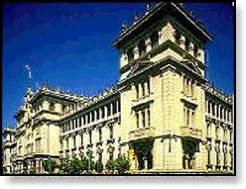
|  GUATEMALA GUATEMALA
merges with globalisation |  |

 Introduction - Economy - Government program - Commerce & Trade - Tourism Introduction - Economy - Government program - Commerce & Trade - Tourism
Telecommunications - Modernization - Public Sector - Privatization - Central America ... Integration
Infrastructure - Reforms - Peace Process 
 PRIVATISATION PRIVATISATION |
The most important part of the privatization program was completed during 1998, as the electricity distribution companies (EEGSA and INDE) and the telephone company TELGUA were privatized. The administrative and usufruct contract, in postal services and railroads respectively, allow the private sector to participate in these services. The Road Maintenance Program by Contract introduced private participation in maintenance and construction of highways. Besides, a private company is operating the Palín-Escuintla road through a toll system. However, less progress has been made in ports.
 An increase in the country´s infrastructure An increase in the country´s infrastructure |
The stock of electricity, telecommunications and road infrastructure increased notably: many more homes have electricity, there are more telephone lines in the country, the highways stock grew with about 1,800 kilometers and the existing highways are in a better state. However, no significant results in railroads, ports and airports were observed.
 The macro laws The macro laws |
The macro laws still block the functioning of the Public Administration. Some reforms were made into the correct direction, allowing more efficiency and transparency in resource management. This is the case for the National Budget Law. However, essential reforms still have to be carried out. Such is the case for the Public Administration Law, as the majority of the ministries still have to implement their reglamentos, and some unnecessary minor regulations that still complicate the task of the ministries, should be abolished. Changes in the State Contract Law and in the Civil Service Law are still pending. The participation of international organizations has been fundamental in overcoming the restrictions these laws impose on the functioning of the government, although it has implied the creation of parallel mechanisms that are not governed by these laws.

These mechanisms have been opportune, and demonstrate that it is urgent to overcome the obstacles imposed by the macro laws, in order to obtain effective functioning ministries. The government needs to keep in mind that, if the reforms are not concluded, the institutional stability of the State Organisms is in danger, because currently there is a ´informal system´ within the public sector. Examples of this are the new sector laws, which in many cases include clauses that avoid the rigidities of the macro laws, and create a parallel regime. As a short-term strategy it could be evaluated positively, but it is not sustainable in the long run.
 Social Funds complicate the modernization of the State Social Funds complicate the modernization of the State |
Most of the social funds administrate their human
resources with autonomy, as they are not subjected
to the Civil Service Law, nor to the State Contract
Law. Therefore, they generally operate outside the
traditional Public Administration structures. For
being autonomous and more flexible, social funds
have yielded results. However, they are becoming
the rule and not the exception, and instead of promoting
a change in the public administration, they discourage
the urgent transformation of the macro systems that
paralyze the Public Administration. Moreover, there
is no clear and effective mechanism to audit them,
because the Ministry of Finance only has knowledge
of the amount of transfers to the funds, but is
not informed on their spending pattern. |
 Recommendations Recommendations |
 Continue with the modernization in infrastructure Continue with the modernization in infrastructure |

During the period 1996-1998, the government carried out several important privatization programs in infrastructure, within a general framework of fostering competition and promoting efficiency. The privatization of companies such as TELGUA, INDE and EEGSA, formed an important step in the de-monopolization of these sectors and the introduction of market mechanisms. However, a key aspect within the process received less attention: an appropriate regulation to break monopolies and foster competition. Although government has carried out several reforms that introduced new regulatory frameworks, this is not enough. Above all, it is necessary to strengthen the position of the regulatory entities, whose autonomy is currently not guaranteed because of their operational and financial reliance on the ministries. It is necessary to strengthen regulation in the infrastructure sectors.
 Carry on with public investment, but not forget maintenance Carry on with public investment, but not forget maintenance |
Although the government made a substantial effort to increase investment in infrastructure and in fact significant improvements have been made, it is necessary to assure that public investment will remain at a high level. Future investment should be directed towards increasing infrastructure coverage in the country even more, so that all Guatemalans will have access to basic services. Perhaps even more important, though, is to invest a large portion in maintenance of existing infrastructure, in order to preserve its good state. The lack of maintenance has been very expensive in the past. The World Bank, for example, indicated that a well maintained paved road lasts between ten and fifteen years before needing new pavement, while lack of maintenance could cause a severe deterioration in half of the time. Timely expenditures worth of US$ 12 billion in maintenance would have saved US$ 45 billion in rehabilitation costs in Africa during the past decade.
 The macro laws The macro laws |
To improve the performance of investment programs in infrastructure, some changes must be made in the State Contract Law and the Civil Service Law. Besides, most of the reglamentos of the Public Administration Law per ministry still have to be implemented, and some unnecessary minor regulations need to be abolished.
 Design a national strategy for social action that defines the role of the Social Funds Design a national strategy for social action that defines the role of the Social Funds |
Both the modernization of the State and the definition of the role of each of the Social Funds must be continued, but based on a long-term vision. The Social Funds must be part of a national program to combat poverty, and control mechanisms and methods to assign resources have to be created. |
 Appendix: the macrolaws and their reforms Appendix: the macrolaws and their reforms |
Law
| Description | Advances in the Reforms
| Comments | National Budget Law (1997)
Decree No. 101-97 and reglamento. | - Rules the budgetary system, the integrated treasury accounting and public credit.
- The Ministry of Public Finance is the ruling agency of the public budget process. | - The new law was promulgated in 1997 and its reglamento in 1998.
- Allows the implementation of the Integral System of Financial Administration -SIAF-.
- De-concentrates financial administration through the Ministry of Finance and UDAF, to be created in each of the budget execution unit (ministries and public sector institutions). | - Implementation of the information system SIAF allows overcoming the problems of reliable and prompt information in every stage.
- UDAF allows a prompt investment payment, easing the administrative burden on the Ministry of Finance
- Both SIAF and UDAF allow better preparation, execution and evaluation of the budget. | State Contract Law (1992)
Decree 57-92, modifications and reglamento. | - Regulates the procedures and requirements that state institutions have to follow when purchasing or selling assets or services.
| - In 1997 the law was reformed (Decree 20-97) to make the sale of state-owned assets and concession of public services feasible.
- In 1997 the Constitutional Court declared some of the reforms partially unconstitutional. | - The bidding process and contracting continues being slow and annoying.
- The incentive to increase costs of goods offered to the State continues, due to lack of certainty on payment. | Civil Service Law (1968)
Decree No. 1748 and reglamento | - Regulates recruitment, transfer, exchanges and discharge of public servants.
| - Although a proposal exists, the Public Administration has not sent an initiative to modify or to replace the law for another new one to Congress. | - The Civil Service Law does not allow the State to have a competitive labor structure.
| Court and Accounts Control Law (1956)
Decree No. 1126 and reglamento
Political Constitution of the Republic. | - Regulates audit of public funds and the use of public funds. | - The Account Court is responsible for the Government Audit System -SAG -.
- In 1998 a law initiative was presented to modify this rule, which allows to apply SAG. | - Still, there is not a verdict from the working Commission of the Congress. | Public Administration Law (1997)
Decree No. 114-97 of the Congress of the Republic. | - Develops the precepts of public administration.
- Each minister is the responsible for public policies in its field.
| - The Public Administration promoted a new law that repealed the previous one (1945), to modernize and to make more efficient public administration.
- The public administration is based on subsidiarity, de-centralization and de-concentration. | - The ministries, with the exception of the Ministry of Agriculture, have not yet approved their reglamento. |
Source: ´Un Estado en Tiempos de Paz´, CIEN. December 1998
|
|
© World INvestment NEws, 2001.
This is the electronic edition of the special country report on Guatemala published in Forbes Global Magazine.
June 11th, 2001 Issue.
Developed by AgenciaE.Tv |
|
|
| | | | |
| |
|

